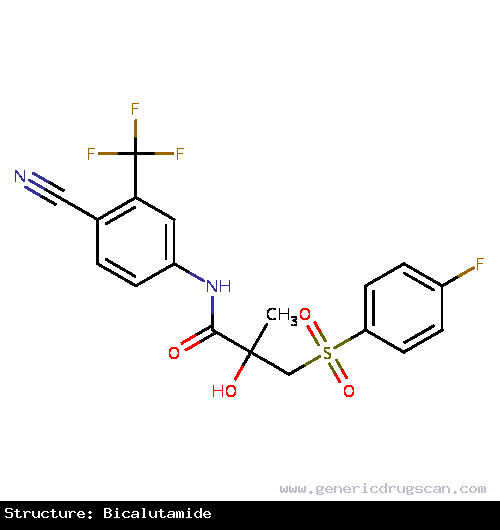Bicalutamide Drug: Indication, Dosage, Precaution, Side Effect , Storage, Category Type and corresponding Brands - www.genericdrugscan.com
Bicalutamide
Drug Status in USA : ApprovedDrug Status in Canada : Approved
pronunciation
pronounced as (bye ka loo' ta mide)
Why is this medication prescribed?
Bicalutamide is used with another medication (gonadotropin-releasing hormone (GnRH) agonists; such as leuprolide or goserelin) to treat metastatic prostate cancer (cancer that started in the prostate and has spread to other parts of the body). Bicalutamide is in a class of medications called nonsteroidal antiandrogens. It works by blocking the effect of androgen (a male hormone), to stop the growth and spread of cancer cells.
How should this medicine be used?
Bicalutamide comes as a tablet to take by mouth. It is usually taken with or without food once a day, either in the morning or evening. Take bicalutamide at around the same time every day. You should begin taking bicalutamide on the same day you begin injecting the luteinizing hormone-releasing hormone. Follow the directions on your prescription label carefully, and ask your doctor or pharmacist to explain any part you do not understand. Take bicalutamide exactly as directed. Do not take more or less of it or take it more often than prescribed by your doctor.
Bicalutamide along with the luteinizing hormone-releasing hormone may help stop the growth and spread of cancer cells but does not cure prostate cancer. Continue to take both bicalutamide and the luteinizing hormone-releasing hormone even if you feel better. Do not stop taking these medications without talking to your doctor.
What are the precautions to be followed?
Before taking bicalutamide,- tell your doctor and pharmacist if you are allergic to bicalutamide, any other medications, or any of the ingredients in bicalutamide tablets. Ask your pharmacist for a list of the ingredients.
- tell your doctor and pharmacist what other prescription and nonprescription medications, vitamins, nutritional supplements, and herbal products you are taking or plan to take. Be sure to mention any of the following: alprazolam (Xanax); anticoagulants ('blood thinners') such as warfarin (Coumadin); aripiprazole (Abilify); buspirone (Buspar); calcium channel blockers such as amlodipine (Norvasc), diltiazem (Cardizem, Dilacor, Tiazac), felodipine (Plendil), nifedipine (Adalat, Procardia), nisoldipine (Sular), and verapamil (Calan, Covera, Isoptin, Verelan); chlorpheniramine; cholesterol-lowering medications (statins) such as atorvastatin (Lipitor), lovastatin (Mevacor), and simvastatin (Zocor); clarithromycin (Biaxin); cyclosporine (Neoral, Sandimmune); diazepam (Valium); erythromycin (E.E.S., E-Mycin, Erythrocin); HIV protease inhibitors such as indinavir (Crixivan), ritonavir (Norvir), and saquinavir (Invirase, Fortovase); methadone (Dolophine); midazolam (Versed); pimozide (Orap); quinidine (Quinidex, Quinaglute); quinine; sildenafil (Viagra); tacrolimus (Prograf); tamoxifen (Nolvadex); telithromycin (Ketek); trazodone (Desyrel); triazolam (Halcion); and vincristine (Vincasar). Many other medications may also interact with bicalutamide, so be sure to tell your doctor about all the medications you are taking, even those that do not appear on this list.
- tell your doctor if you have or have ever had liver disease.
- you should know that bicalutamide is only for use in men. If taken by pregnant women, bicalutamide can cause abnormalities in the fetus. Women who are or may become pregnant should not take bicalutamide. If you take bicalutamide while you are pregnant, call your doctor immediately.
What are possible side effects of this medication ?
Bicalutamide may cause side effects. Tell your doctor if any of these symptoms are severe or do not go away:- hot flashes or flushing
- bone, back, or pelvic pain
- muscle weakness
- muscle or joint pain
- headache
- shortness of breath
- increased blood pressure
- swelling of the hands, feet, ankles, or lower legs
- cough
- constipation
- nausea
- vomiting
- abdominal pain
- diarrhea
- gas
- change in weight (loss or gain)
- loss of appetite
- dizziness
- pain, burning, or tingling in the hands or feet
- difficulty sleeping
- feeling of uneasiness or dread
- rash
- sweating
- inability to get or keep an erection
- need to urinate frequently during the night
- bloody urine
- painful or difficult urination
- frequent and urgent need to urinate
- difficulty emptying bladder
- painful or swollen breasts
- yellowing of the skin or eyes
- pain in the upper right part of the stomach
- extreme tiredness
- unusual bleeding or bruising
- lack of energy
- upset stomach
- loss of appetite
- flu-like symptoms
- dull or sharp side pain
- chest pain
Bicalutamide may cause other side effects. Call your doctor if you have any unusual problems while taking this medication.
How to store the medication and dispose it of after its use later?
Keep this medication in the container it came in, tightly closed, and out of reach of children. Store it at room temperature and away from excess heat and moisture (not in the bathroom). Throw away any medication that is outdated or no longer needed. Talk to your pharmacist about the proper disposal of your medication.
Drug Category/Class
- Anti-Androgens
- Hormone Antagonists and Related Agents
- Endocrine Therapy
- Cytochrome P-450 CYP2C19 Inducers
- Cytochrome P-450 CYP2C9 Inhibitors
- Cytochrome P-450 CYP2C9 Inducers
- Antineoplastic and Immunomodulating Agents
- CYP2D6 Inducers
- CYP2D6 Inducers (strong)
- CYP3A4 Inhibitors
- Anti-androgens
| Prescribed | For treatment (together with surgery or LHRH analogue) of advanced prostatic cancer. |
| Weight : | 430.373 |
| Structure | Bicalutamide |
 | |
| Formula | C18H14F4N2O4S |
Bicalutamide has 15 Brands listed
Search Generic Drugs alphabetically
